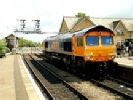Archive Section




A Lecture by Karl Watts (Managing Director, Rail Operations Group)
Tuesday 6th November 2018, 55 Broadway
Written by John Doyle
Karl has had a long career on the railway, working in a wide range of roles over forty years. Along with two colleagues, he founded the Rail Operations Group (ROG) and following a reorganisation of the company, is now Chief Executive Officer of Rail Operations (UK) – a holding company of which the Rail Operations Group is now a part.
Karl has previously given a talk to the Institution and summarised ROG's role as providing a specialist service to other parts of the rail industry. ROG supports manufacturing by the delivery and testing of new trains and Train Operating Companies by the transfer of rolling stock. While rail privatisation is seen by some to have brought several benefits, the standardisation which characterised the former British Rail has been lost. Train equipment, such as couplers and brake control electronics have now become diverse, as individual TOCs and manufacturers have developed equipment to suit their perceived needs.
ROG is characterised by adopting an innovative approach to its activities. Karl was able to illustrate this by the example of diesel locomotive hauled emu workings which had previously required dedicated match wagons and often several freight vehicles to provide brake force.
Such formations inevitably complicated making up trains, shunting and because of speed restrictions of 45mph, pathing issues caused lengthy delays. Therefore, ROG adapted it’s diesel locomotives to enable flexible coupling and through braking, which drastically simplified train working and increased the speed of operation to 70mph.
The economic conditions which have made the procurement of new trains attractive to franchisees is resulting in something of an avalanche of new trains – all of which are providing significant business for ROG.
Around 7000 new passenger vehicles are entering service over the next several years, and at the same time several fleets of trains which have the potential for some form of reuse are coming off lease. These trains need to be stored, and to capture some of this market ‘Traxion' has been established as a subsidiary of Rail Operations (UK). Karl summarised the three states of storage as, ‘cold, warm and flight ready’. Traxion have initially secured two sites: the previously out of use engineer’s South sidings at Crewe and part of the Marks and Spencer distribution site at Castle Donnington. Train storage clearly complements ROG's train movement activities, and the establishment of separate subsidiaries having been intended to preserve the integrity of the brand.
The third subsidiary of Rail Operations (UK) third is ‘Orion’ which is a further reflection on the innovative nature of the company. Karl reflected on changes in the market for the movement of goods. Structural change in the UK economy has resulted in the virtual disappearance of heavy industry, evidenced by the fortunes of rail freight. While in recent years the development of on line commerce has resulted in rapid growth of light goods vehicle traffic (‘white vans’). What might be viewed as ‘heavy' intermodal trains are doing well, but have the inherent disadvantage of the need for trans-
Orion has been established to take advantage of the opportunity to operate relatively high speed light intermodal trains. Karl envisioned a not too distant future in which a network of such trains would operate between centres of population supported by the use of autonomous battery vehicles for final distribution movement.
The audience were inspired by this future ‘vision’ and with memories of the old BRUTE (British Rail Universal Trolley Equipment) system at the fore, were convinced by Karl of its potential to soon become a reality. As an initial step, Orion have ordered two tri-
The fourth subsidiary is Rail Operations Passenger Ltd, and is currently a dormant organisation, but was established with an eye to the future!
Karl concluded his talk with the exciting announcement that an order is about to be placed with Stadler for ten Class 93 25kv AC Electro Diesel locomotives (with an option for 10 more) financed by Beacon Rail. The locomotives will be similar in outward appearance to the Class 88’s operated by Direct Rail Services. They will be light weight at under 90 tonnes and will have many commonalities with the Class 88 to simplify the approvals process, but they will have several bespoke features.
Diesel power will be of a greater output and supplemented by Lithium Titanate (LTO) batteries, adaptable couplers, flexible brake systems and passenger door controls.
It is expected that production, delivery and commissioning will take around 24-
Karl’s talk was extremely well received by the audience, who were impressed by his delivery, enthusiasm and vision for the future.
For more information on the Rail Operations Group, visit: hwww.railopsgroup.co.uk/